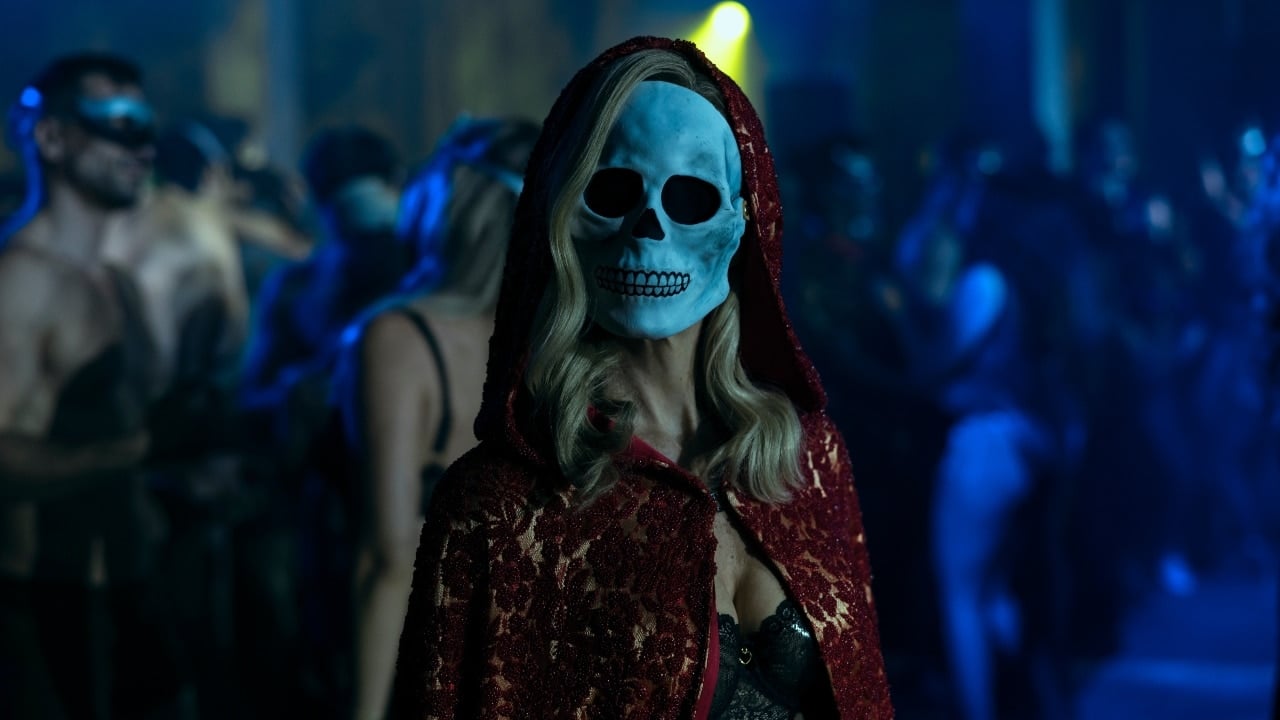‘The Fall of the House of Usher’ Review: A Captivating Exercise in Terror

This piece was written during the 2023 WGA and SAG-AFTRA strikes. Without the labor of the writers and actors currently on strike, the series covered here wouldn’t exist.
The arrival of autumn brings with it renewed interest in all things macabre, including the return of two major horror-themed TV series, FX’s American Horror Story and Netflix’s The Fall of the House of Usher. The release of the two series just weeks apart evokes a subgenre of horror: that of the psycho-biddy. Like Blanche and Jane in Whatever Happened to Baby Jane, series creators Ryan Murphy and Mike Flanagan duel via their shows for the affections of the audience, and grow ever more grotesque in doing so.
For the record, we intend the grotesquery as a compliment. In the case of The Fall of the House of Usher, Flanagan melds and adapts the works of Edgar Allen Poe to the present day. The plutocratic Usher family has spent years enjoying their wealth as the board of Fortunado Pharmaceuticals, enjoying lives of power, drugs and promiscuity. In the case of patriarch Rodrick Usher (Bruce Greenwood), a lifetime of hook-ups has led to an ever-expanding progeny of both legitimate and illegitimate children, all of whom bicker for control of ever-larger shares of the family money.
Familiar Relations

An investigation by US Attorney Auguste Dupin (Carl Lumbly) has exposed Fortunado’s major product as a highly addictive opioid and invited even further scrutiny of the Usher clan’s shady past. That includes the dealings of Rodrigo’s sister and fellow board member Madeline (Mary McDonnell), and longtime family attorney Arthur Pym (Mark Hamill). The arrival of a mysterious woman named Verna (Carla Gugino) also sets off a string of supernatural events that further threaten to expose the sins of the past.
With American Horror Story and House of Usher debuting head to head, avoiding comparisons feels impossible, less between the shows themselves and more between the minds behind them. Both Ryan Murphy and Mike Flanagan have found enormous success in bringing horror to the era of pique TV. Both look to genre classics for inspiration. Murphy evokes cinematic entities such as Friday the 13th or, in the case of this season’s AHS: Delicate, Rosemary’s Baby. Flanagan turns to literature as his muse, drawing inspiration from Poe and, in previous seasons, Shirley Jackson and Henry James. Both producers have adopted their own repertory companies: Murphy re-discovering stars Hollywood has forsaken (Angela Bassett, Jessica Lange, Billy Porter); Flanagan, great actors that Hollywood either never granted major stardom (Greenwood, McDonnell, Gugino), or figured out what to do with (Henry Thomas, T'Nia Miller, Hamill). Both men deserve high praise for their reinvigoration of the genre, and for giving great thespians meaty roles.
From there, however, the parallels end. Murphy, despite his enormous talent as a producer (not to mention his advocating for LGBTQ people on both sides of the camera and within the public consciousness), lacks an even hand when it comes to writing and directing his shows. AHS has a reputation for going way off the rails in comic fashion every season to varying degrees. Indeed, Murphy’s best series—American Crime Story, Ratched, Feud—are the shows where he turned over showrunning duties to other writers.
The Art of Horror

Mike Flanagan, by contrast, as he demonstrates in The Fall of the House of Usher, has a much greater gift for writing and directing. Over the course of eight hours, House of Usher maintains a consistent momentum, granting each of the Usher clan depth and screentime ample enough to let the audience get to know—and hate—every one of them. Don’t look for “filler” episodes here. That balanced pacing also gives each actor time to shine in their respective roles. Here, Gugino stands out the most, playing several variations of her character, ranging from seductive vamp to dowdy housewife to butch security guard. Flanagan has adopted her as a muse throughout his The Haunting Of… anthology as well as his film Gerald’s Game, and House of Usher might be her best performance to date.
Fans of Poe’s work—or the previous Roger Corman/Vincent Price tongue-in-cheek adaptations of them—will have a ball seeing how Flanagan hides reference after reference to the author’s bibliography. Each episode plays like a scavenger hunt of sorts, wherein viewers can spot a name, an object, a plot point, and so on that hearkens back to Poe. Like the Corman/Price cycle, House of Usher also has a black sense of humor to it—scenes of characters drowning in acid or eviscerated by a falling pendulum are genuinely frightening and, on some level, very funny. Seeing loathsome people get their comeuppance has a certain satisfaction to it, and the absurd ways Poe/Flanagan offs their cast will also evoke a peppering of snickers along with the shivers.
Though Flanagan doesn’t have Murphy’s flamboyance—Murphy shows look and feel as well-produced as any film—Flanagan does have a better sense of direction. Not only does he get great performances from his cast, but several action scenes, including a rave gone haywire and an apocalyptic vision, have a cinematic scope.
Digging It Up

Flanagan also has something to say about his characters and the current sociopolitical moment. For all of Murphy’s showmanship, American Horror Story never dives deeper than surface level to examine philosophical or moral questions. Flanagan uses House of Usher as an opportunity to indict the 1%; he’s obviously modeled the Usher clan on the Sackler family and Purdue Pharma’s heroin pushing. Beyond that, Flanagan also skewers analogs of Elon Musk, Gwyneth Paltrow, and Elizabeth Holmes for their self-righteous entitlement, ego, and indulgence.
Perhaps this observation best encapsulates the Flanagan/Murphy contrast: Ryan Murphy has cast moneyed nepo-baby Kim Kardashian in his new season of AHS. In The Fall of the House of Usher, Mike Flanagan, especially through characters played by Kate Seigel and Samantha Sloyan, indicts the whole Kardashian clan and its grift.
What the dueling Kardashian-fu of it all says about Murphy, Flanagan, or America, we will leave to greater minds to decide. As entertainment goes, The Fall of the House of Usher succeeds in telling an engrossing, thoughtful, and genuinely scary tale that never lags or holds back in its rebuke of the obliviousness and malice of the world’s kleptocrats. Mike Flanagan asserts himself as one of the great storytelling talents of our time and uses his show to say that an evil more dangerous than demonic animals or ax murderers pervades society today.
Now, that is a terrifying thought, indeed.
Rating: 8.5/10 SPECS
The Fall of the House of Usher arrives on Netflix on October 12.

